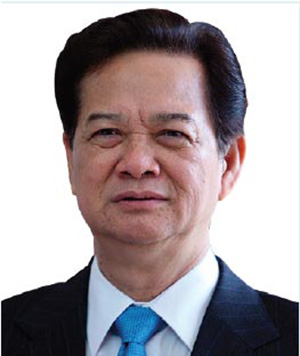Improved business climate in the spotlight

As the old saying goes, a picture paints a thousand words. This was certainly the case when Khalid Muhmood illustrated the complicated nature of Vietnam’s business administrative procedures by using a photo of a woman carrying six heavy files of documents to a state agency meeting to prove that her education centre was doing what it had been licensed for.
Muhmood, the founder of the Apollo English Centre and the British University Vietnam, and who is also the head of the Education and Training Working Group at the Vietnam Business Forum (VBF) held in Hanoi last week, said that nowhere else in the world did people have to carry such a huge bunch of documents just to report that their licensed businesses were running well.
“The legal procedures for granting licences for new investment projects are the same as the legal procedures for re-investment projects,” said Muhmood, adding that if a successful university wished to expand its campus to a new location it had to go through the same application process as if it were an entirely new investment.
Greater civil services needed
Over the past decade, the Vietnamese government has actually been trying to reduce the amount of red tape and simplify administrative procedures in order to enhance its investment climate. Just two weeks ago, the National Assembly officially approved the amendments to the laws on Investment and Enterprises, after two years of preparations by the Ministry of Planning and Investment under the direction of the government.
Bui Quang Vinh, Minister of Planning and Investment, described the amendments to these laws as a “skin peeling” that will resolve the fundamental shortcomings that have been hampering the nation’s business climate over the past ten years.
But while top leaders of the nation are determining to make a positive change, the business community still has doubts about the strict implementation of the new laws, given their experiences with local authorities in the past.
“We understand that the Ministry of Planning and Investment (MPI) has made great efforts to simplify the investment registration and business registration procedures through various revisions to the laws on Investment Law and Enterprises. However, there remain significant concerns with respect to the actual implementation of such laws,” said Tran Anh Duc, a member of the VBF’s Investment and Trade Working Group.
Duc said currently the procedure to obtain an investment certificate was still very complex and cumbersome. Businesses here must spend a significant amount of time on the preparation, explanation, and supplementation of unnecessary information to various authorities. In many cases, the licensing time is also lengthened with cross-consultations between departments of Planning and Investment and people’s committees or relevant ministries. Sometimes, departments of Planning and Investment may put an application on hold for as long as two or three months while it awaits feedback from the various other agencies.
“A licensing system will not work if the public officials tasked with implementing it are permitted to refuse applications at their own discretion. The turnaround time for an application is prolonged due to multiple requirements for explanation and application resubmissions,” said Duc. “Sometimes, licensing officials may even make an attempt to act on behalf of the court or lawyers by reviewing contracts or charters submitted to them for compliance with law.”
Premier’s promise
The VBF last week marked the third time this year that Prime Minister Nguyen Tan Dung has met with the local and foreign business community to discuss solutions to enhance the business climate in Vietnam.
In 2014, Dung said Vietnam successfully stabilised the macro-economy at around 5.9 per cent of growth, in line with a low inflation rate and a stable local currency. However, at the VBF he said the achievements did not meet his expectations.
“We will continue to make favourable conditions for investors through the improvement of the business climate,” said Dung, implying that the government would continue removing existing burdens for investors.
|
We are open to comments to study and complete policies and mechanisms that are closer to the realities of everyday business. This will create conditions for the business community to develop as well as create conditions for the sustainable development of the country. Vietnam has significantly improved the investment climate, but the results are still lagging behind the expectations of both the government and investors. There are existing challenges and we understand that we must be more drastic to ensure rapid and sustainable growth.
The Trans-Pacific Partnership, EU-Vietnam Free Trade Agreement, Regional Comprehensive Economic Partnership and the full implementation of the ASEAN Community are also potentially huge opportunities for Vietnam’s economy and people. I want to particularly highlight the overarching issue of the need for administrative reforms that would both address the ease of doing business in Vietnam and provide additional anti-corruption measures for our companies to further integrate into the global supply chains and provide the much needed supporting industries. These agreements will require new laws and regulations of a high standard, but administrative reform is just as important.
There is a lot of interest from infrastructure operators and from banks and funds to bring money to Vietnam, but with the current rules it is almost impossible. Meanwhile, other ASEAN countries, which, on average, are well ahead of us in terms of rules and experience, are continuing their improvements and attracting increasing investment.
This year saw some significant accomplishments in terms of the economy in general and the role of the private sector. With a stable macro-economic situation, Vietnam looks set to become the largest ASEAN supplier to the US by the end of 2014 – with a net export value of about $30 billion. This is a historical achievement for a nation surrounded by supply chain giants. The prospects for the coming years are even better, though some of the bilateral and multilateral trade agreements that are necessary for this continued growth are facing obstacles that require us to find every possible means to enhance efficiencies and strengthen competitiveness. |

 Prime Minister Nguyen Tan Dung
Prime Minister Nguyen Tan Dung Virginia B. Foote, co-chair of the Vietnam Business Forum
Virginia B. Foote, co-chair of the Vietnam Business Forum Tomaso Andreatta, vice chairman of the European Chamber of Commerce
Tomaso Andreatta, vice chairman of the European Chamber of Commerce Fred Burke, head of Investment & Trade Working Group
Fred Burke, head of Investment & Trade Working Group